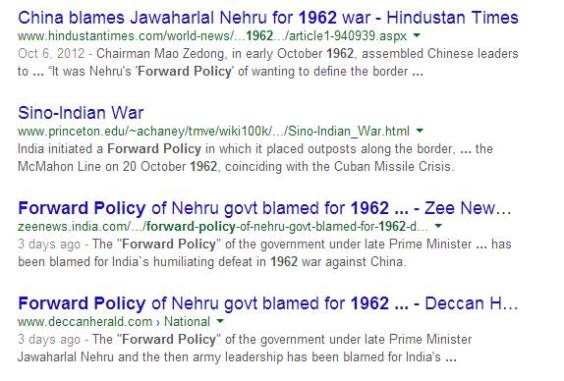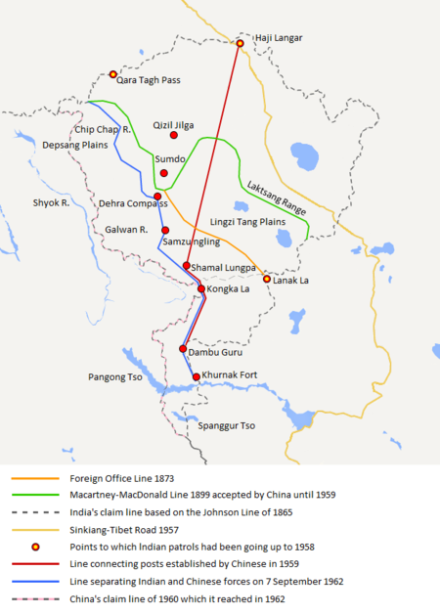The real reason behind prevalent confusion over the boundaries of Northern India with Tibet today lie not so much with British, Chinese, Tibetan or Indian map makers. They would have tried their best to demarcate what possibly should never have been demarcated in the first place in this manner if China was not present in Tibet. How does one demarcate portions that have never been inhabited except in passing by nomadic tribes that moved between established positions in India, Tibet, Xinjiang for centuries? The answer is not so difficult. Tibet developed in a way that it was culturally, linguistically and religiously a special cousin of India. It contained many places which are considered the holiest of holy spots for tens of millions of Dharmics in India. Kailash Mansarover region for one where pilgrims from India, Tibet, Nepal have been visiting for millennia without Visa’s and border controls. So how should one really demarcate Kailash-Mansarover from Uttarkhand? It would never make sense demarcating the KM region with Uttarkhand based on a Westaphalian concept by a mapmakers in London and Beijing. Thus despite whatever agreements on Westphalian lines or as Tithe between emperors in London, Beijing, Lhasa, Srinagar, Delhi may have been at particular stretches of time, the reasons for dispute must be none of these.
Border disputes today are largely due to presence of very conflicting doctrines across Westphalian divisions. A US-Canada border requires the presence of simply border guards and no armed troops to prevent Canadian or US armed forces from crossing over and certainly no armored divisions or pieces of artillery along the borders. The border in fact is just a straight line along a latitudinal parallel. EU within itself has shown the irrelevance of armies patrolling borders between Sweden, Norway or Belgium and Holland. Simply put, when nations are like minded and the people inherit a shared prosperity and respect, Westphalian border disputes become irrelevant. Yet what about India? India too with Bhutan and Nepal, holds no armed forces or artillery units neither do these countries require to do so. That is because of centuries of cultural, religious, linguistic kinship and non conflicting visions on modern development and statehood. An entire 3 generations of Indians have grown up witnessing no border controls and border problems between Nepal, India, Bhutan.
That is exactly what should have been the relation between an Independent Tibet and India. Between the two there would not have been a single armed division across thousands of kilometers on our Northern boundaries. Kailash-Mansarover would have been managed without Visa grants from Beijing and managed between Tibet, Nepal and India for the benefit of millions of devotees. Aksai Chin would be irrelevant and any agreed boundary between Tibet and India would be acceptable. Visits to Tibet would require the same formalities for Indian citizens as we require for Nepal or Bhutan. But that remains a wish dream today, even though we should be working to restore that status quo. China invaded Tibet and established complete control. The means for travel and transport in the 20 and 21st century changed the equations in many ‘no man’ lands. A Totalitarian regime was on our Northern borders with claims of agreements, pointing out thick pencil borders they did not agree to, arguing for a no nonsense Westphalian division over no mans lands and in the process bargaining over even what was in our possession. With a militant Islamic State on our West and East and a Totalitarian Communist entity on our North every inch of the border was under cartographic and actual armed assault. Armored units, artillery divisions and soldiers began to patrol areas to our North.
Nehru with his left, ‘liberal’ views and emerging from the ‘victory’ of a Non Violent movement against the British empire had sneering contempt of the armed forces. Military planning and upgrading equipment were neglected. Generals who opposed the neglect were summarily dismissed or made redundant and those that assuaged Nehru that it could be managed under these circumstances were pushed up the hierarchy. So post Chinese aggression of Tibet and a decade later from then, India’s defense capabilities were in shambles when the Chinese began enforcing their version of Westphalian boundaries on our Northern periphery. Nehru meanwhile had put all his eggs in the basket and started to appease Chinese as brothers, urging the UN to grant them entry, acknowledging their aggression over Tibet and of course neglecting his own armed forces.
As the Chinese were encroaching in many areas that were considered ours and making roads till several points on our ‘borders’ to get military and artillery supplies. Nehru had no option but to order a denuded army to take some action. The Generals claimed confidence that the Chinese would never attack and that some show of strength by establishing border posts and patrolling in those areas would send a signal to the Chinese to withdraw more North. That was more wishful thinking borne both out of complacency, incompetence and the fact that the Army had no turn around time to challenge the Chinese. Yet there was no choice to aggressive patrolling and creating forward posts. It was the only response possible, even though flawed because of the neglect of the Armed forces under his tenure. The flaws for 1962 thus lie beyond Nehru’s Forward Policy.
The reasons for the Indian debacle are simple and do not require great expertise and could be broadly, jotted as:
- Nehru’s criminal neglect of the Armed Forces.
- Nehru acknowledging Chinese aggression of Tibet
- Nehru’s left Pseudo liberal approach to problem solving
- Lack of long term clarity and vision of the region.
- Blind trust in a regime built on a Totalitarian foundation.
If Nehru had not neglected the Army and tried appeasing China, Tibet and KM might not have been lost in the first place. And even if Tibet was taken, his forward policy approach would have pushed the Chinese back up north. Aggressive patrolling and establishment of border posts was commenced not by Nehru but the Chinese. Nehru’s Forward policy was a response and trigger for sure because of his neglect of the armed forces, yet it was the only option. Backing out would have resulted in complacency and possibly resulted in even losing Ladhak and Arunachal. But the aggressiveness of even a weakened army and non usage of the Airforce would have made China think twice over retaining Tawang and returning. Chinese soldiers also witnessed many ill equipped units take last stands and fight to the last man, last bullet. So was the aggression shown really out of place in itself? A Forward Policy with an Army armed to the teeth was the ideal requirement that was lacking.
A Forward Policy with an Army armed to the teeth was the ideal requirement that was lacking, thanks to Nehru’s lack of strategic vision. Yet the forward policy in itself was not such a bad thing and the focus should not be that Nehru started 62 war because of the Forward policy. This is being translated across media as implying India was the aggressor. It was not. It is being translated as Forward Policy = Nehru’s aggressive patrolling and establishment of forward posts = the reason for 1962 Indo-China war = reason for India’s humiliation. Hence ‘do we need to curb aggressive patrolling and claiming forward posts that can hurt Chinese sentiments’. We will learn the wrong lessons if we take this approach. A look at some media reports suggesting same from headlines is shown below: 
The danger in criticizing Forward Policy alone for the 62 humiliation or using it as a headline also lies in promoting leadership/ Generals that will desist from asking the Army to take tough decisions on the borders when needed on the grounds that it could evoke a 62 like response. The lessons we need to learn is not to appease totalitarian regimes, to stand by Tibet more openly, build our Armed capabilities, offensive and counter offensive abilities, even claim/ make disputed territories well inside Tibet like Kailash and Mansarover. Importantly we also must put a stop to the nonsensical cartographic aggression on our Northern boundaries, on no mans lands and our holiest spots being made by 19th or 20th century people in Beijing and London. The agreements between Beijing and London on our Northern boundaries should have no sanctity in Independent India.
The only sanctity we can have of a Westphalian boundary is with the Government of Tibet. And we must draw up one with the elected representatives of the Tibetan people. With the Govt in Exile at Dharmasala, Mr Lobsang Sangay and HH Dalai Lama. We need to draw up an agreement with these elected, well respected and loved members of the Tibetan community and get a signed agreement on our boundaries, joint management of Kailsah Mansarover between Nepal, Tibet and India. Then we should use this map as our official Westphalian agreement on our Northern borders. Any agreement with the Chinese should be on Line of Actual control and not the Westphalian boundary between Tibet and India. That is best left between Tibet and India.

Well researched article and the points are valid. The problem is that India now has not been able to articulate a Dharmic view to govern itself internally or to manage its external relationships. In recent years, AK Antony as Defense Minister under Manmohan/Sonia has done exactly the same in terms of defense preparedness as what Nehru did.